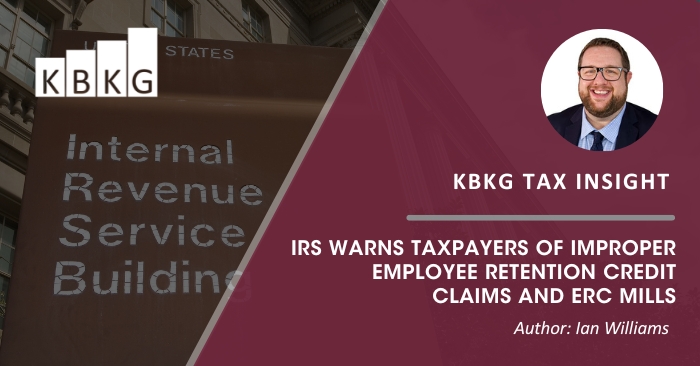Important Update as of Tuesday, March 7, 2023: The IRS issues renewed warning on Employee Retention Credit claims; false claims generate compliance risk for people and businesses claiming credit improperly.
The IRS recently published IR-2022-183, warning employers to be wary of third parties who are advising them to claim the Employee Retention Credit (ERC) when they may not qualify. As part of this notice, the IRS included several red flags that business owners and CPAs should look out for, many of which we have highlighted in our previous articles featured in Accounting Today. As ERC mills continue to aggressively market these positions, the IRS pointed concerned CPAs and taxpayers to Form 3949-A, which can be used for whistleblowers to report tax-related illegal activities related to ERC claims.
KBKG Insight
The IRS is well aware of the abuse in this area and is gearing up to audit ERC claims. We have seen some initial audit activity and heard from the IRS recently on their approach, outlined below:
- They now have 300 agents that they are focusing on ERC who have all been through a training program.
- They are considering creating a “voluntary disclosure” program for anyone who thinks they were targeted by an ERC mill and erroneously claimed credits. This may relieve those Taxpayers of penalties and interest.
- While the IRS hasn’t published any specifics on their process for determining which claims to audit, we expect them to focus on larger claims initially. Documentation should be maintained for any ERC claim, but we expect additional scrutiny of any government shutdown claims outside of the industries most affected by COVID shutdowns (e.g., restaurants, hospitality, etc).
- A specific issue related to IRS audits we are monitoring is the discrepancy in the IRS statute of limitations for auditing ERC (5 years) compared to the statute of limitations for amending business tax returns (3 years). The IRS requires tax return wage deductions in the year associated with the ERC claim to be reduced to avoid getting a double benefit. This means that Taxpayers claiming ERC for a 2020 period will need to amend the corresponding 2020 tax return (2021 tax return for 2021 ERC claims) to make this adjustment and either adjust NOL carryforwards or pay the additional tax resulting from this adjustment. Based on the current statutes, in the event of an IRS disallowance of an ERC claim in year 4 or 5 of the IRS audit statute, a Taxpayer may have to pay back the credits and not have the opportunity to amend tax returns (with expired 3-year statutes) to reclaim the lost deductions. It will be several years before this has any impact, so we hope the IRS will proactively address it.
Conclusion
While there is an alarming amount of fraud in this area, we continue to speak with CPAs and their clients who have legitimate cases for ERC claims. Business owners should be wary of Credit companies using mass marketing techniques to contact them. It’s strongly recommended that businesses ask their CPA for a referral to a reputable firm with a proven track record dealing with IRS audits spanning at least 15 years.
Action Steps
KBKG has a team of experts solely focused on assisting CPAs and their clients with navigating the complexities of all of the Employee Retention Tax Credit rules. We not only help businesses with documenting eligibility and calculations, but we stand behind every project by including audit support with every engagement. Please contact your Regional Business Development Director or visit our website to see how we can help you or your clients benefit from this valuable service.
Download: IRS warns Taxpayers of Improper Employee Retention Credit Claims and ERC Mills
Related Articles
KBKG Tax Insight: IRS warns Taxpayers of Improper Employee Retention Credit Claims and ERC Mills- IRS To Target Abusive ERTC Claims. Analysis of Government Shutdown & Supply Chain Rules
- It’s Not Too Late to Claim Employee Retention Tax Credits
- 2020 vs. 2021 Employee Retention Credit Comparison Chart
About the Author
Ian Williams – Director
 Southeast
Southeast
Ian Williams is a Director for KBKG, specializing in Research & Development and employment tax credits. Ian spent eleven years at a Big Four accounting firm specializing in R&D tax credits and fixed asset studies across a variety of industries. He has extensive experience in software, heavy manufacturing, aerospace, automotive, and consumer products industries, as well as defending credit claims with the IRS. » Full Bio


